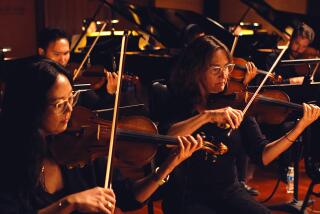CHRISTMAS THOUGHTS : Calendar’s critics share their love of the arts: the gift each would give a friend today : MUSIC
Contrary to conventional wisdom, audiences are not passive.
Indeed, in choosing events to attend, selecting performances within a run, finding particular seats within a particular price range and differentiating between alternating casts, members of our musical audiences can be extremely active. And picky.
Their pickiness comes from experience. No one begins his listening life knowing the difference between pianists as dissimilar as, say, Andre-Michel Schub and Murray Perahia. One learns the distinctions.
And the distinctions are important. For the survival of the art--the art we all serve, one way or another--it is imperative that audiences of the future recognize and differentiate those varieties of musical quality and achievement that make separate artworks, artists and performances unique.
Without an educated, musically literate and sophisticated audience to receive the gifts fashioned by composers and performers, music will not survive. Partisans, and partisanship, keep it alive; people who care maintain its standards. Since the value of music lies in its power to move the listener by expressing feelings outside the realm of words, only those receptors awaiting and appreciating art at the business end of its production can ensure its continuance.
Were it possible to build--or, better, design--one active and sophisticated listener for the audience of 2008 (just 20 years hence), I would start today by giving a 5-year-old a year’s supply of piano, or guitar, or violin, or tuba, or cello lessons.
To any average 5-year-old, one neither particularly bright nor particularly talented, just normally musical and culturally malleable, that first year might begin to open ears perhaps formerly unsensitized. At worst, it would improve motor skills. At best, it would bring them into the community of listeners.
Follow that up with five more years of participatory music learning. The lessons to be acquired here are many--how about doing two things at once, for starters?--but include the obvious ones that pianos do not play themselves, that all groups need leaders and that different musical choices produce different musical results.
Expose the child to glee clubs--are there such things, still?--where singing is fun, and shared, and where entertaining others begins to take on the stature of a craft.
Allow more participatory experiences in choral groups, and/or in bands and orchestras, where skills can be developed and the concept of art can be introduced gently, and where healthy competition encourages finer results than mere doing.
Encourage the individual’s looking into the rewards of solo performance, not with a view to pursuing professional goals, but to developing the person’s unique talents toward their fuller expression.
Add the dimension of small-ensemble participation--call it chamber music, if you want--where personal interaction always increases musical sensitivity. And, throughout the process, maintain concert-going for pleasure and for the further expansion of horizons.
Who will this young person be at the end of these two decades? An appreciative audience member and a musically literate, hopefully unsnobbish, amateur--one who may have some basic performing skills, but, more important, a great deal of listening skills.
For his/her own entertainment, he/she can now discern between the poor and the accomplished, between the merely flashy and the truly virtuosic, between sounds actually full and sounds merely loud, between quality and its lack. He/she will be a happier listener as well as a more educated one.
More to Read
The biggest entertainment stories
Get our big stories about Hollywood, film, television, music, arts, culture and more right in your inbox as soon as they publish.
You may occasionally receive promotional content from the Los Angeles Times.










